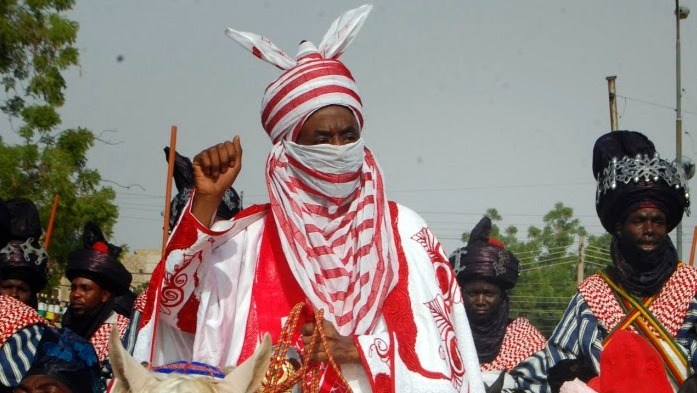Sarkin Kano, Sanusi II, Edo Governor, others discuss irregular migration at book launch

Sarkin Kano, Alhaji Muhammad Sanusi II, and the Governor of Edo State, Mr. Godwin Obaseki, were some of the dignitaries present at a book launch on irregular migration.
At the event on Thursday, Governor Obaseki said irregular migration and human trafficking are a problem of the people of Edo State.

The event was the presentation of a book titled, “From Frying Pan to Fire”, written by the Chairman of the Editorial Board of Thisday Newspapers, Mr. Olusegun Adeniyi, on “How Africans risk everything in their futile search for a better life in Europe.”
Obaseki said people must admit that the problem exists before they can find a solution to it.
“As the saying goes: The first step in solving a problem is the acknowledgement that the problem exists. In Edo State, we have acknowledged and accepted that since almost 65 per cent of irregular or traffic migrant come from our state, we have a problem. Rather than being in denial, we have accepted we have a problem.”
The governor thanked the author for putting the book together, saying the issue is pertinent to Edo State
He traced the root of the desperate cause of migration to economic and family pressures, lack of jobs, ignorance or just the sheer urge to move away from home “since their belief is that anywhere but home is better.”
On how the government was trying to curb the problem, Mr Obaseki said with or without support from international agencies or governments, the state is determined to find a solution.
“We see this as an Edo crisis and we will give it our solution. We have decided to set up our own anti-trafficking agency at the state level and also decided to reenact with stiffer penalties federal anti-trafficking laws in Edo state.”
He said while trying to set up the Edo migrants that returned in vocational schools, the government discovered 5000 centres for human trafficking posing as vocational centres, which it closed down and opened real vocational centres.
He said the state discovered stricter laws are required to prosecute human traffickers as there are over 4000 cases and nothing serious was being done.
He suggested that the government lives up to its responsibilities to provide quality public services, particularly to those communities that have the most immigrants.
In his remarks, Sarkin Kano, Alhaji Muhammad Sanusi II, who was the chairman of the occasion, said the discourse on migration is like a discourse on extremism – “how much of it is a result of circumstances, poverty, ignorance, climate change and how much of it is of people having a wrong idea.”
The Kano Emirate Leader said Africans, who risk their lives to travel to Europe while exposing themselves to death, human trafficking and prostitution, deserve good life at home so they would not have to invade Europe in search of a better life.
“What can we do to solve the energy crisis in Africa, instead of complaining about people running around in the Saharan trying to go to Europe? How many silver panels can we put in the Saharan to generate energy and help small-scale industries so they can have a life?” He asked.
The Commissioner for National Commission for Refugees, Migrants and Internally Displaced Persons, Sadiya Umar, also attended the launch of the book.
She said about 36,000 Nigerians made up 21 per cent of the 171,299 immigrants who arrived Europe by sea in 2016. In the same year, the number of Nigerian women trafficked mostly for sex work doubled from 5,600 in 2015 to about 11,000 in 2016. About 200 Nigerians also drowned in the sea, she said.
The Director-General of NAPTIP, Julie Okah, who was represented by the leader of prosecution, Abdulrahim Shaibu, said they at NAPTIP were impressed when people take it upon themselves to enlighten the community on the danger of human trafficking and irregular migration.
The author, Mr Adeniyi, said the travails of his brother who was nearly lost between 1993- 1998 inspired the book. He said he was also inspired by the Libya story that trended last year.
He said the book exposed him to more shocking facts, especially his experience in Bamako, the capital of the West African country of Mali.
“I got help from the IOM so I was able to hear gripping stories from those girls that IOM were trying to repatriate back to Nigeria. In the IOM warehouse, some of them were sold by their poor parents.”
He said his experience was an eye-opener on how poverty, both of the mind and material, makes people take such actions.








